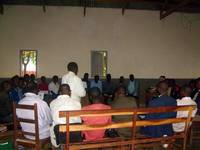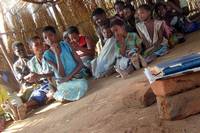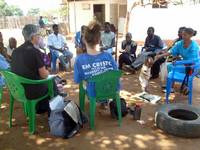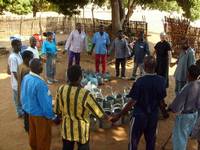Visit Report 2008
To give some seminars on Stigma and Discrimination in relation to HIV/AIDS
September 2008
[Source: Revd Ann Clarridge, Associate Vicar at St Augustine of Canterbury, Whitton]

My journey started last year when I first met Rebecca Vander Meulen, the HIV/AIDS co-ordinator for the Diocese of Niassa in Mozambique. Rebecca was passing through London on her way home to America for a holiday. We met at an ALMA meeting where Rebecca had been invited to speak about her work. In conversation after the meeting I said that I had always wanted to visit Africa and Rebecca said “well why don’t you?” or words to that effect. I could not think of any good reason and so, many, many months later, I finally achieved a life long ambition.
It was the first time that I had travelled abroad completely on my own and it was with some trepidation that I set out. My journey started at Heathrow and from there to Nairobi and then on to Lilongwe in Malawi. I was met by Carlos the driver of a Toyota Land Cruiser and Dionisias bearing a placard “Reverend Ann Clarridge” – me! It was 11am on 12 September and I was here in Africa!
Ahead of us lay a ten hour drive to Lichinga, which is where the Diocese of Niassa has its headquarters called “Kuchigingi.” Because of the lateness of the plane’s arrival we made an overnight stop in Mangoochi before travelling to the border and Mozambique the next day.
The first thing I noticed was the difference in the road quality - the roads are mostly straight, flat and tarmac in Malawi but the roads in Mozambique undulate with the hills and are made of impacted earth - the amazing red earth.
The people of the area are great brick makers and bricklayers. They make the bricks from the soil and build the bricks into mounds. In the base of each mound they allow space for placing wood which they set on fire. In this way the bricks are ‘fired’. The peoples homes are mostly brick built with thatch roofs – the thatch being replaced at about this time each year, after the harvest and before the rains.
The country’s Civil War ended in 1992, just sixteen years ago, so some people have started to put more permanent roofing on their houses – in time of war there was no point.
Our journey to Lichinga (starting at 5.30am) was uneventful, with a brief stop at the market to buy some provisions to keep us going.
The roads are busy during the day, but not with motorised vehicles. People walk or ride bicycles. Everything is carried on their heads or on their bicycles. One man had a bundle of grass, a bag of charcoal and several live chickens balanced on his bicycle. They are travelling to and from market, either buying or selling goods. Some people will travel several hours one way in order to sell produce or to buy provisions. Vegetables, bundles of wood and sacks of charcoal are also for sale on the roadside in each of the villages.
The main language spoken is Portuguese, but English is taught in the schools and so people were very keen to try out their English. This made my life easier given that I do not speak any Portuguese. Although I can now say “hello, how are you” and “yes I am fine thank you very much”!
One of the things that I am determined to do in preparation for my next visit is to take up evening classes and try to learn Portuguese.

One of the most memorable occasions during my visit was a day in Mecanhelas, which started in the morning when I met with the people who belong to the local Equipa da Vida - Team of life. We sat outside the Church where it had been arranged to meet. The Church was being used as a classroom because the local school did not have enough classrooms for all its children.
The group of men and women formed a choir and sang three songs - one about Daniel in the lions den, one about Jesus telling us to take up our Cross and follow him. The first song however, was about a visitor (me) “we thank God for bringing you to us” they sang. What a start to the day and all before 9am!
The group introduced themselves and talked about what they do as a member of the Team of Life. They visit people who are sick and unable to manage. The visit might entail helping the sick person to wash, to cook food for them, to go to the market for them, or perhaps even to help them farm their land so that they will have a harvest next year. But the greatest service they offer is the unconditional regard and love for these people who may or may not be being discriminated against because of the stigma of HIV/AIDS.
After spending some time with the group I was taken to meet some of their ‘clients’. It was such a privilege to be invited into these peoples’ homes and spend time with them and pray with them.

After lunch we went out into the country to meet more Equipa da Vida teams. This entailed travelling many miles and several hours but it was so worthwhile to meet with these people who are undertaking such a valuable and caring service. It was also great to celebrate the Mass with the people – “a woman priest is that really true” - and to hear their singing.
The day came to an end with a meeting of young men who are attending school, but who live too far away to make the journey from home each day and so they stay in a hostel. Padre Justus has been going into the hostel and preaching the Gospel and he had told the young men about the ‘visitors’ and they expressed a wish to meet Rebecca and myself. We talked about faith and about being a Christian and also about HIV/AIDS, so it was quite challenging.
What a day!
Finally, I need to say something about the seminars which were a major part of my visit. Each seminar ran for a day starting around 8am - 8.30am and finishing around 3pm with a lunch break in the middle. The people attending the seminars were Priests, Catechists - a role similar to that of Reader – and women from the Mothers’ Union, a very strong movement in Mozambique. The topic of the seminars was Stigma and Discrimination in relation to HIV/AIDS. I had prepared the material for the seminars before I left England and had planned to have several different sessions in the day, each looking at a different aspect of stigma and discrimination and using different teaching and learning styles. I had to rely very heavily upon Rebecca for translating and interpreting the material for me. I owe Rebecca a great deal for the success of the seminars. We did have fun though. I introduced a game ‘Simon says’ which I am sure people here know very well, but which was completely unknown to them. We had a lot of laughs seeing the men and the women jumping around in response to ‘Simon says’! And also, they engaged very fully with the role play, especially the women – some of them have missed their calling and should be on the stage! However, on a more serious note I was very moved by the personal stories of each of the people who came to the seminars, stories which they shared with one another with such honesty, stories of discrimination and personal threat. The feedback through Rebecca was very positive, that people had appreciated what they had learned from the day and how they would be able to take it back into their work as members of the community, church and Teams of Life.

For my part I learned something of the way of life of people in Mozambique. I learned a lot about the strength of faith which brings hope for a better future. I have some excellent photos of the people which will be a constant reminder to pray for them and for their work.
However, there is much work still to be done and I am hoping that the congregation of St Augustine’s will see their way forward in the New Year to specifically supporting Padre Justus and the church at Mechanhelas - in prayer and in financial aid - and more generally, in supporting the work of the people in the Diocese of Niassa through prayer and financial aid.
My thanks go to Rebecca who made my trip so memorable and to all the people that I met along the way in terms of hospitality and travel – their open hearted and generous care of a complete stranger. I look forward to seeing you all again.